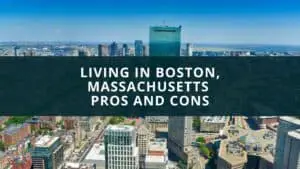Are you thinking of moving to Brockton? Then you must wonder how it feels to live in this city of less than 100,000. No need to wonder again because you’re about to find out. So, what’re the pros and cons of living in Brockton?
The almost 100,000 residents of Brockton have reasons for staying. These include diversity, arts and culture, education, and youth-oriented community. But it’s not all rosy in Brockton; there are challenges too, such as the prevalence of crimes, economy, transportation, urban sprawl, and high costs.
Despite the challenges, Brockton could still be an ideal place for you. But, of course, it all depends on what you’re looking for in a city. Read on to find out if Brockton has what you’re searching for.
Quick navigation
Pros of Living in Brockton
The benefits of living in Brockton are numerous, and they include
1. Most Diverse Suburb
Niche.com recognizes Brockton as the most diverse suburb in Massachusetts, which says a lot about the city. It’s also the second most diverse place to live in the state, with every ethnic, cultural, age, and education group ably represented.
2. Vibrant Arts and Culture Scene
Brockton is a city with heritage and lots of art and culture within it. This means residents will have a lot of places to go and several activities to participate in. There are various sites and sights you can check out here, such as Fuller Craft Museum, Campanelli Stadium, Brockton Fire Museum, Westgate Lanes, PROVA Brockton, etc.
Whatever your interest is, whether it’s sports, entertainment, games, arts, crafts, or nature, you’ll find the right place to explore in the city.
3. Quality Education
If you’re moving with children or planning to start a family while living in Brockton, schools will be one of the first things you consider. Fortunately, the public education system in Brockton is very good, which means you can have your pick of the best schools for your kids to attend. The city spends more on education, $13,127 per student, than the national average of $12,383.
The number of students per teacher or per librarian is also lower in Brockton than in the country. This means your children will get more attention from the educators, which will aid their learning experience. So, if quality education in the formative years is a priority for you, you should consider Brockton.
4. Youth Oriented City
With the average population here around 35, the city is youth-centric to a large extent. This reflects in the education system with the high graduation rate and in other areas too. Brockton has won the 100 Best Communities for Young People Award four times. In Brockton, the community is committed to ensuring young people succeed.
Cons of Living in Brockton
As a resident of Brockton, you have to deal with the following problems.
1. Higher Crimes Than Many Cities in Massachusetts
Crime is perhaps the biggest challenge of living in Brockton. The city’s crime rate is 83% above the Massachusetts average and 11% higher than the national average. In addition, violent crimes in Brockton surpass the national average by 116%. As a resident in Brockton, your chance of being a crime victim is 1 in 37. With all these, you’ll agree that this city is not the safest place to be.
However, the property crime rate is 8% below the national average, which means your property is likely safer than you are in Brockton. Despite all these, it’s still safer than 8% of cities in the US. So you’ll find secure areas within Brockton, and the total crime rate is reducing.
2. Economic Issues
Despite being in the Boston Area, this city doesn’t have a great economy that Boston can boast of. The median household income in Brockton is $58,469, which is lower than the national average of $62,843. The unemployment rate isn’t also favorable. It was 8.80% in July 2021, which is higher than the national average. So, getting a job here might be a little tricky.
The state of Brockton’s economy has a telling effect on its poverty rate, which is 14.8% which is high by any standards. So, Brockton isn’t the economic hub you might be expecting to live in.
3. Transportation Challenges
Traffic is a significant problem in several cities in the country, and unfortunately, Brockton is one of them. As a result, residents here have to deal with the more extended time they spend commuting. For example, the average one-way commute time in Brockton is 30.9 minutes, that’s 26.4 minutes higher than the national average.
Most people here use cars to get around, but you can also use public transport options. For instance, 7.5% of residents use public transit to get to work which is higher than the US average. Unfortunately, WalkScore rates Brockton 36/100 for public transit, which means few options are available. However, it scores higher on walkability, which is 51, and bike-ability, which is 46. So you can complete some errands on foot, and there’s bike infrastructure, even if minimal.
4. Urban Sprawl
The zoning system in the city affects new construction in the city. Most new homes in Brockton are single-family homes which means the suburban sprawl in Brockton continues to expand, eating deep into the downtown parts of the city.
5. Expensive Despite Ailing Economy
Despite the weak economy here, the city suffers the curse of being in the Boston area regarding the cost of living. Brockton’s living cost is 17.6% above the national average. Of course, you can take consolation in that it’s lower than the Massachusetts average, but that might not be enough given the economy.
One of the things that contribute to the high cost of living in Brockton is housing. The average price of a home in Brockton is $402,969. So, you’ll be paying a premium for living here. However, the closeness to Boston, which is less than 1 hour away whether you drive or take a train, makes it a little worthwhile.
In Conclusion
Living in Brockton can be quite an experience for you. This mid-size city has lots of advantages which you’ll enjoy as a resident. But you should also consider its disadvantages before moving.



